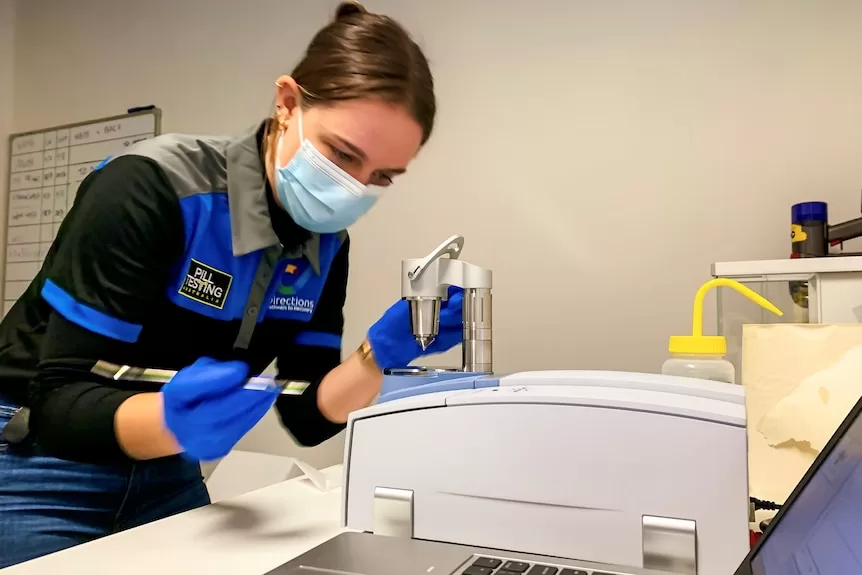- In short: Canberra’s pill testing service CanTEST has found N-pyrrolidino protonitazene (NPP) in brown granular powder presented for testing.
- It’s the first time the synthetic opioid — thought to be 25 times stronger than fentanyl — has been detected in the ACT.
- What’s next? CanTEST has issued a red alert community notice warning NPP carries a high risk of fatal overdose and there is no safe level of use.
A super-strength street drug believed to be 25 times more potent than fentanyl has been detected in the ACT for the first time.
Chemists at Canberra’s pill testing service, CanTEST, issued a red community notice on social media on Saturday after discovering the synthetic opioid N-pyrrolidino protonitazene (NPP) in a granular brown powder presented for checking.
“The material was unusual compared to what we often test,” said CanTEST’s clinical lead David Caldicott.
“Neither crystal, nor powder, but more the consistency of instant coffee granules. Quite unusual.”
It’s the first time CanTEST has issued such a notice this year, and only the fourth time since operations began in Civic in mid-2022.
“A red alert is something that we issue very rarely,” explained Dr Caldicott.
“It is a reflection of how serious we think the impact of drugs like this can be on the wider community.”
Dr Caldicott said early concerns prompted CanTEST analysts to pull an “all-nighter” into Saturday to ensure the message got out to the public quickly.
“What often takes up to two weeks to turn around, they did in under three hours,” he said.
Shift in the illicit drug market
NPP is a newly emerged high-potency synthetic opioid that carries a significant risk of fatal overdose.
“It’s from this broader family of concern, the nitazenes, which appear to be rearing their ugly heads in Australia at the moment,” Dr Caldicott explained.
Last month, the National Centre for Clinical Research on Emerging Drugs (NCCRED) warned of the “emerging impact of nitazenes in the Australian illicit drug supply” since it was first reported in 2021.
It was detected in Europe and North America in 2019, and in New Zealand in March 2022.
“For several months now, community workers and clinicians have expressed a concern that something has shifted within the [illicit drug] market, and so, we’ve actively sought this product and its ‘relatives’,” Dr Caldicott said.
“CanTEST has detected other nitazenes previously but this is the first time we’ve found this particular variety.”
25 times stronger than fentanyl
Dr Caldicott said NPP was 25 times more potent in its effects than fentanyl, a drug used regularly in medicine.
The NCCRED considers it 200 times stronger than morphine.
“It causes respiratory depression,” Dr Caldicott said.
“It stops you breathing and it renders you unconscious.
“It has a tendency to make consumers drop quite quickly and, when it is widespread within the community, it can create multiple overdoses which can place a significant burden on healthcare systems.”
Nitazenes have been identified in Australia sporadically and have been represented as everything from heroin and oxycodone, to ketamine.
“They’ve been found in pills and most people use pills … expecting stimulation,” Dr Caldicott said.
“So, when they are rendered unconscious, they know that something bad is happening.”
Naloxone, a readily-available medicine, can help counter the effects but multiples doses may be required and an ambulance should always be called whenever an overdose is suspected.
“The biggest concern that we have is nitazenes’ entry into the intravenous market; people who use heroin and the like,” Dr Caldicott said.
“That could be very problematic for people who are not expecting this effect.”
Compounding concerns, fentanyl testing strips do not detect nitazenes.
‘A drug nobody should be using’
Since Saturday’s discovery, CanTEST administrators have been in touch with their counterparts in Ireland where NPP has been “sold falsely described as ‘new’ heroin or ‘strong’ heroin”.
“They had quite a shocking experience at the end of last year in which 50 people were afflicted over a five-day period in Dublin, and then, further on in December, 20 [people] in Cork,” Dr Caldicott said.
“So, we’ve got some information from them.”
The drug has also been linked with deaths in Scotland and the United States.
“This is a drug that is on the spectrum as being significantly more dangerous than many others,” Dr Caldicott said.
“This is a drug that nobody should be using and this is a drug that we need to chase down and remove.”
Posted , updated
